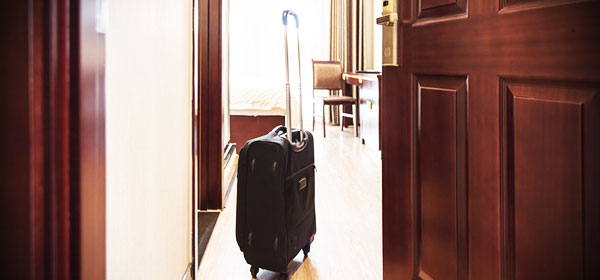Many a trusting soul will leave their hotel room of a day or night and think nothing of leaving their possessions inside. After all, hotels are a safe place, right?
Sure they are. Hotel owners and staff do everything they can to make sure your valuables – and you – are safe and protected within their walls.
But it also turns out that hotels are prime targets for opportunistic thieves.
Take this account, for instance:
“It’s jarring to return to a five-star hotel room late at night and find the door propped open. But interrupting a pair of teenagers inside, as they rifle through your suitcase, is even more disconcerting. I should know—it happened to me. My reaction was instinctive: I barked at the boys to come to the lobby with me, only to watch them scramble out of a side door as soon as the elevator opened, and before hotel security could collar them. Fortunately, I was unharmed, and nothing was taken. But worse than the foiled burglary itself was the hotel’s reaction to it,” wrote Mark Elwood for Condé Nast Traveler.
Hotels operate almost as a rogue state. Often, hotels discourage guests from making police reports because they don’t want to damage the establishment’s reputation. And without irrefutable evidence to support claims of stolen items, and unless your property was entrusted to the hotel for safekeeping, the Innkeeper’s Act in each state makes it very difficult for a guest to be compensated for theft. Even then, some states only require innkeepers to pay back $100.
That said, one expert claims that at least one theft a day occurs in every big city hotel in the US. That may not be surprising in the US, but it’s really not an uncommon occurrence in Australian capital cities either.
So, how does it happen?
One study claims that almost 40 per cent of hotel thefts occur in rooms. Another says it is just 10 per cent in rooms and 90 per cent in public areas.
Most thefts are ‘opportunistic’. A common method for thieves is to wander down the corridor and push on every door they walk past. If one opens, they go in and pilfer your property.
Other thieves are a bit more creative. Some will trip a fire alarm, which automatically unlocks all electronic locks on doors to allow for easier evacuation. Thieves then test each door in the hope that one of the door locks hasn’t re-engaged.
Or there are the crooks that pose as hotel guests, maybe even wearing a hotel robe when telling housekeeping “I seem to have lost my key, can you let me in my room?”
Then there is the really scary scenario, where a burglar will somehow gain access to your room while you sleep.
“They hope you’re sleeping and drunk, so they can go in and lift something from you,” said criminologist Bob Arno.
“If you wake, they can simply claim to have made a mistake in accessing the room, blaming misprogrammed key cards.”
Some techie types can build electronic master keys that can open any hotel door. This would lead many to think that simply snibbing the security latch will keep out would-be kleptos, but evidently these latches are easy to unlatch with a cable tie or keycard.
You would assume that, with all the cameras in most large hotels, your stuff would be pretty safe – or at least if it was stolen, the thieves would be easily identifiable. But cameras cost money and not all hotels are adequately covered by CCTV.
So, how do you protect your property?
A tip I was given when I first stayed in New York, was to empty my suitcase on to my bed (once I had checked it for bedbugs) and take a photo of everything. That way you have proof of all your belongings.
Use the in-room safe, but first check that it’s actually ‘safe’. Some of these electronic lockboxes have an override code, which is usually 000000 or 1234. Try these codes first and if they pass the test, use the safe. Or hand your precious items to the front desk and ask them to guard them for you.
Another trick is to stick a fork or knife in between the door and doorjamb, or wedge it under the door. You may even push an armchair or desk chair against the door.
Or take solace in the fact that, most of the time, a missing item is not stolen, but rather, misplaced or hidden inside clothing or a pocket in your bag.
Whatever you do, though, make sure you have travel insurance that covers theft and lost property.
Have you ever had something stolen from a hotel?
Related articles:
Does housekeeping go through your stuff?
Who’s been in your hotel bed?
Most commonly stolen hotel items

